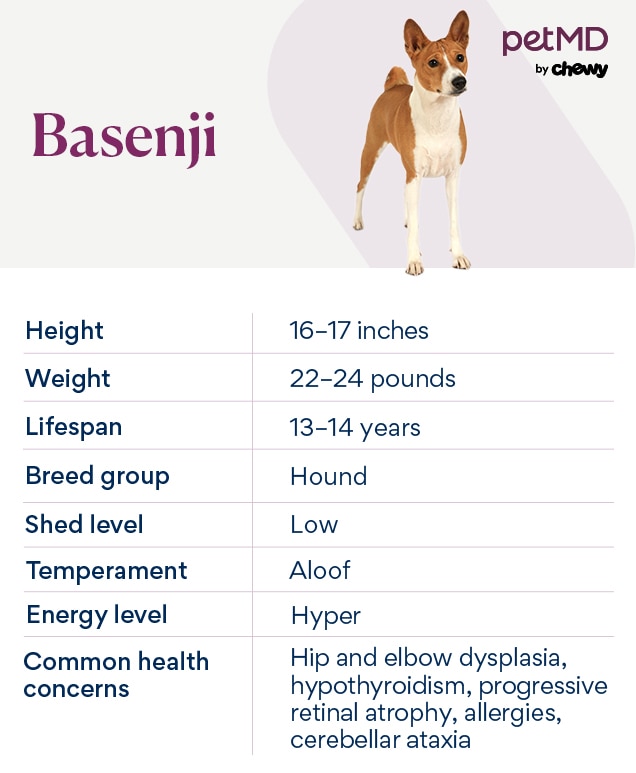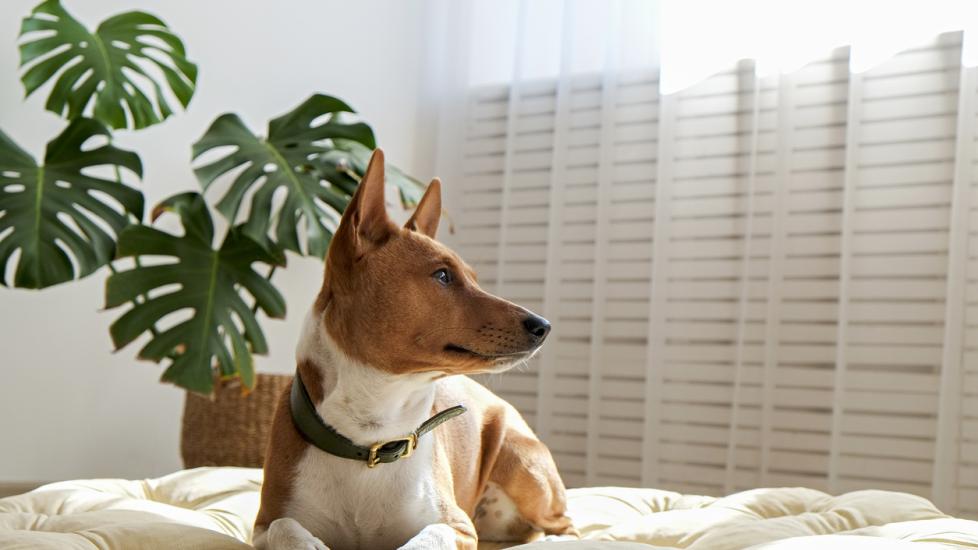Basenji
The Basenji is an ancient dog breed from Africa. Cave paintings found in Libya have been dated between 6000 BCE and 100 CE by paleontologists; they depict Basenji-type dogs living alongside humans as hunting companions, according to the Basenji Club of America.
Basenjis are small, standing 16–17 inches at the shoulder. They are graceful and agile, able to jump vertically, and have a short, smooth coat and tightly curled tail. Basenjis are sometimes called the “barkless dog” because they tend to be quiet. But when they do speak up, they make their characteristic “Basenji yodel” noise. These are independent, intelligent, and energetic dogs.
Caring for a Basenji

The Basenji’s personality can best be described as catlike. They are generally independent dogs, can be wary of strangers, and are fastidious about cleanliness; Basenjis will often groom themselves like a cat!
They are very intelligent, high-energy, and easily bored. Without training and exercise, Basenjis can be mischievous and get into trouble. These African dogs need daily playtime or training sessions. When you take them outside, make sure they’re on a leash or inside a fenced area—the Basenji is historically a hunting dog, and their high prey drive means they might be prone to chasing squirrels.
Basenji Health Issues
The Basenji breed is generally healthy if kept active and not overfed. They typically live 13–14 years—about the average lifespan for dogs. But they are prone to some health conditions pet parents need to stay vigilant for.
Hypothyroidism
Hypothyroidism in dogs is the result of an autoimmune disease that destroys the hormone-producing cells in the thyroid gland. Thyroid hormone is important for metabolism and skin health.
Dogs with hypothyroidism typically will not show signs until after a substantial amount of the thyroid gland is destroyed. Typically, you will see:
-
Low energy
-
Dull coat
-
An increase in skin infections
Replacement thyroid hormone in the form of a daily medication will manage the disease. With treatment, dogs can live a normal, healthy life.
Fanconi Syndrome
Fanconi syndrome is a genetic disease affecting the kidneys. It causes protein and sugar from the blood to leak into the urine, eventually leading to kidney failure and death.
There is a DNA test to look for the markers of Fanconi syndrome. If your Basenji has the DNA marker, a screening urine test will help detect if they are developing the disease. Good Basenji breeders will test their dogs for the genetic marker to avoid breeding puppies that will become sick.
Progressive Retinal Atrophy (PRA)
Made of rods and cones, the retina is the part of the eye that receives light signals and converts them into nerve signals for the brain. It’s essential for vision.
When a dog has progressive retinal atrophy, the number of rods and cones decreases over time. The result is gradual loss of vision. Rods diminish first, resulting in the loss of night vision. Then cones are lost, resulting in overall loss of vision. Because it is a slow change, many dogs learn to cope with their partial blindness in their home environment; you may not notice your dog has lost significant vision until you take them outside.
PRA is not treatable and will eventually cause complete blindness. Responsible Basenji breeders will screen their dogs regularly, and remove any affected dogs and their children from the breeding pool.
Hip Dysplasia
Hip dysplasia is a developmental disease common in many dog breeds. As puppies grow, there are three bones in the pelvis that must fuse to form the hip joint around the top of the femur. If those bones don’t fuse properly, it results in a hip joint that is too shallow or loose.
This eventually causes pain and arthritis. Have your veterinarian evaluate your dog every six to 12 months for signs of pain or decreased mobility of the hip joints. X-rays can detect hip dysplasia, and the condition can be managed with medication and supplements to reduce pain.
What To Feed a Basenji
Basenjis should be fed a high-quality commercial dog food approved by the Association of American Feed Control Officials (AAFCO). Basenji puppies should be on a puppy diet until they are 1 year old.
How To Feed a Basenji
Basenjis can be fed once or twice a day. Due to their curious nature and intelligence, feeding them with a puzzle feeder can benefit them and keep them busy. Stay mindful of how many treats you’re giving your Basenji—because they’re only around 20 pounds, the extra calories can add up quickly.
How Much Should You Feed a Basenji?
The amount of food you give a Basenji depends on their weight, health, lifestyle, and other factors. Talk with your veterinarian about how much to feed your dog. You can also find guidance on portion sizes on your AAFCO-approved dog food bag.
Nutritional Tips for Basenjis
Because Basenjis are prone to hip dysplasia, you can start them on a joint supplement when they’re 1 to 2 years old. Using a high-quality joint supplement containing glucosamine and chondroitin can slow the progression of arthritis. Commonly recommended brands are Cosequin, Dasuquin, and VetriScience.
Behavior and Training Tips for Basenjis
Basenji Personality and Temperament
The Basenji is highly intelligent, very energetic, and prone to mischief. They are hounds with a keen sense of smell and, because of this, may wander off in search of a scent. Whenever a Basenji is outside, they should be kept in a fenced yard or on a leash. But know that they can jump quite high, so you’ll need a 6-foot-tall fence.
The Basenji can be aloof and independent, but they also need extended exercise and play sessions to keep them out of trouble. They can be wary of strangers and might not do well with small children, who can make Basenjis anxious with their unpredictable behavior. Early socialization and training are vital for helping a Basenji dog thrive.
Basenji Behavior
Without enough exercise and mental stimulation, Basenjis can be destructive. To prevent pillow-shredding, keep your dog busy and entertained so they don’t become bored.
Though they’re loving with their family, Basenjis might be standoffish around new people. Early socialization and training help make them more adaptable and comfortable around new people.
Basenji Training
Basenjis are very intelligent dogs and they respond well to positive reinforcement training. They are, however, easily distracted and become bored quickly, so training sessions should be kept short and fun. Use a variety of strong-smelling training treats to keep your Basenji’s attention.
Fun Activities for Basenjis
-
Scent training
-
Agility
-
Lure coursing
-
Running
-
Hiking
-
Long walks
Basenji Grooming Guide
Though their minds require a lot of attention, Basenjis are low maintenance when it comes to grooming. They have a super short coat and will often groom themselves like a cat.
Skin Care
Basenjis don’t require special skin care unless they develop a skin infection. If you notice any signs of a skin infection (red, bleeding, or scabby skin; sores; hair loss; or a greasy coat), take your dog to a vet as soon as possible.
Coat Care
To keep your Basenji’s coat clean, a short brushing session once a week is perfectly fine. They generally don’t need to be bathed unless they get very dirty or if your veterinarian recommends it.
Eye Care
Basenji dogs don’t require special eye care. But any redness or cloudiness of the eyes; squinting or holding the eyes closed; or yellow or green discharge from the eyes should be evaluated by a veterinarian as soon as possible.
Ear Care
A Basenji’s ears should be cleaned every two to four weeks. Pet parents should check their dogs’ ears weekly for discharge, redness, or abnormal smell. Any of these changes should be evaluated by a veterinarian as soon as possible, as they can be signs of an ear infection.
Considerations for Pet Parents
Bringing home a new dog is a big commitment, and the Basenji breed is no exception. These dogs are smart and active, which means pet parents need to be prepared to give them the daily attention and exercise they need to be happy. Otherwise, you might come home to find your living room turned into a destruction zone.
Basenji FAQs
How much does a Basenji cost?
The typical Basenji pup costs $800–$2,000, depending on the breeder and your location. A show dog-quality Basenji puppy will cost more—between $2,000–$4,500. Basenjis are expensive because they’re a rare breed and only come into heat once a year, according to the breed club.
How much exercise does a Basenji need?
Basenjis require at least an hour of exercise every day. They can join you on your morning walk or run, and this breed is also happy competing in dog sports like agility and luring.
Do Basenji dogs bark a lot?
Basenji dogs are very quiet and rarely make noise. Basenjis do not bark, but they can make a yodeling noise.
Is the Basenji a good family dog?
Basenjis are affectionate toward their families, though they do best in a home with older children who know how to properly interact with pets. As long as your Basenji is socialized, trained early, and kept active, they make a very good family dog.
Featured Image: iStock/Evrymmnt
